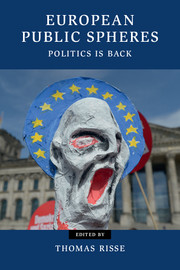Book contents
- Frontmatter
- Contents
- List of figures
- List of tables
- List of contributors
- Preface
- 1 Introduction
- Part I How to grasp the Europeanization of public spheres: theory, methods, empirics
- 2 Theorizing communication flows within a European public sphere
- 3 How advanced is the Europeanization of public spheres? Comparing German and European structures of political communication
- 4 National media as transnational discourse arenas: the case of humanitarian military interventions
- 5 European issue publics online: the cases of climate change and fair trade
- Part II Consequences: does the Europeanization of public spheres matter?
- Part III Theoretical and normative implications
- Bibliography
- Index
5 - European issue publics online: the cases of climate change and fair trade
Published online by Cambridge University Press: 05 November 2014
- Frontmatter
- Contents
- List of figures
- List of tables
- List of contributors
- Preface
- 1 Introduction
- Part I How to grasp the Europeanization of public spheres: theory, methods, empirics
- 2 Theorizing communication flows within a European public sphere
- 3 How advanced is the Europeanization of public spheres? Comparing German and European structures of political communication
- 4 National media as transnational discourse arenas: the case of humanitarian military interventions
- 5 European issue publics online: the cases of climate change and fair trade
- Part II Consequences: does the Europeanization of public spheres matter?
- Part III Theoretical and normative implications
- Bibliography
- Index
Summary
A comprehensive examination of the European public sphere must consider Europeanization from below, of, and by civil society. As Jürgen Habermas argues, civil society has a key role to play in a democratic public sphere: civil society actors at the periphery of the formal political arena have the potential to bring new groups of citizens into the political debate and to highlight problems that may become central to the agenda (Habermas 1996c). If this potential were undermined, it would seriously exacerbate the democratic deficit in the European Union (EU) (Habermas 2006c). This chapter takes stock of the European public sphere with a focus on organized civil society and civil-society actors’ digital communication beyond the mass media.
Earlier studies have found that civil society is weakly represented in the European public sphere, leading to concerns about the lack of broad public engagement or citizen-level political contention. When the capacity of the (national) mass media to employ Europeanized frames and attend to transnational issues or actors is analyzed, the picture that emerges is an issue-driven European sphere in which a few issues or claim makers may reach different national media using similar frames during common periods. However, there is little civil society in this picture: claims are overwhelmingly made by elites who communicate to largely passive audiences. For example, when the European financial crisis erupted in 2010, national papers across the EU were filled with similar pronouncements from various officials, including national leaders such as German Chancellor Angela Merkel and EU officials such as the head of the European Central Bank. Civil society tends to be sketched in terms of voters in Greece or demonstrators in Spain, with few concrete authoritative claims attached. Beyond demonstrations and elections, there is little in the way of media characterizations of broader public engagement with the crisis and other policy issues that cut across both EU and national-governance processes. The question is whether civil society engagement in European public spheres is weak in itself or whether it is simply not captured in these analyses of mass-media content. We suggest that part of the answer may be the latter possibility. To analyze civil society dimensions of European public spheres, it makes sense to look beyond the mass media to the increasingly common alternative forms of public communication that civil society actors utilize.
- Type
- Chapter
- Information
- European Public SpheresPolitics Is Back, pp. 108 - 138Publisher: Cambridge University PressPrint publication year: 2014
- 7
- Cited by



